- Home
- Elizabeth Goudge
The Little White Horse Page 21
The Little White Horse Read online
Page 21
She leaned over the well again, reaching her hand and arm down through the ferns, and groping for those attractive hidden cupboard places in the wall of the well that Sir Benjamin had shown her on her first day here, and that she had thought would make such a splendid hiding-place for jewels. In the first little cupboard she could find only cheese, but the second she tried had the butter. It was rather a small pat, she found, when she had pulled it out, and she wondered if it would be enough, for Marmaduke Scarlet’s delicious omelettes were always very large and very buttery indeed. Perhaps there was a second pat farther inside. She leaned right over the parapet of the well this time, as far as she could, and groped with her hand right to the very back of the little cupboard.
She could not find any more butter, but her fingers touched what felt like a small metal box, and she sat took hold of it and pulled it out. It was a box, and she sat on the parapet of the well again and put it in her lap. It was very old, but she could still make out the cock upon the lid. The box was not locked and she opened it. Inside was a bit of discoloured, rotting silk, that seemed to fall almost to dust when she touched it, and folded within it was a string of gleaming pearls.
Maria sat motionless, holding them in her fingers, her lips parted in amazement at the beauty of them. Over her head the sunset sky had changed from blue and pink to gold, and the white doves strutting around her had gold-tipped wings. The wind had dropped and it was utterly still. Very slowly Maria lifted her hands and twisted the pearls round her neck, then she leaned over the well again and looked once more at her reflection. The sunset must have got into her sandy hair, as well as into the doves’ feathers, for she saw it this time shining like pure gold about her white face; yet more full of light than the pearls about the column of her white throat. She smiled at her face in the water and the face smiled back at her, and so still and lovely was the moment that it seemed as though the whole world held its breath.
Maria sat up again and thought about the pearls. As though the first Moon Maiden had told her, she understood how they had come to be hidden in the well. The Moon Maiden had sat here for a little while on the night she went away, and she had wondered who the pearls belonged to, whether they were her own because her father had given them to her, or her husband’s because they were the only dowry she had brought to Moonacre. She had not been able to decide, and not wanting to take away what was not hers, nor yet to give her husband wealth to which he had no right, she had hidden the pearls in the well.
A squeaky voice once more sounded forth loudly and a little indignantly from the top of the kitchen steps, ‘Young Mistress, the hour is late —’
Maria loosened the pearls a little, pushed them inside her coat and buttoned it up on top of them. Then she took the pat of butter and slowly and sedately walked up the kitchen steps into the house.
CHAPTER ELEVEN
1
MARIA that night slept very deeply for a few hours, and then woke up abruptly to find her little room as bright as day. At first she thought that the morning had come, and then she realized that the most brilliant moon she had ever seen was shining in through her window and flooding her room with light. The silver waves of it came washing in through the uncurtained window rather as the waves of Merryweather Bay had come rolling in to break at her feet in welcome.
There was something very friendly about this moonlight, as though tonight’s moon loved her and claimed her as a sister, and was lighting up the world for her alone. She unfastened the moony pearls, that were still wound about her neck, and held them up in her hands almost as though she were offering them as a gift, and the moon, shining upon their loveliness and making it ten times more lovely, seemed to be accepting the gift.
And yet Maria did not want to give those pearls away. She loved them far too much. She did not want to give them even to the lovely moon, and as for giving them to the Men from the Dark Woods — well — she just couldn’t do it. And yet she had to do it. Monsieur Cocq de Noir had promised that They would stop being wicked if she could give him proof that Black William had not been murdered by Sir Wrolf but had withdrawn to a hermit’s life by his own choice, and if she would give him the pearls.
That first condition was already fulfilled, for when he was pursuing her and Robin he would have seen Black William’s hermitage with his own eyes; and the pearls he would have, too, if she could bring herself to give them to him . . . And then he would not be wicked any more, and complete happiness would come to the Moonacre Valley . . .
Somehow Maria did not doubt that if she kept her part of the bargain, Monsieur Cocq de Noir would keep his. The wickedest of men have good in them somewhere, and, remembering the direct look in his eyes, she felt quite sure that he was not a man who would break his word. Yet she felt she could not give him these pearls, that she had found herself and that seemed already a part of her.
‘If I could only give them to you,’ she said to the moon. ‘But I don’t want to give them to that horrid man.’
And then it struck her suddenly that if she gave her pearls to Monsieur Cocq de Noir she would, in a way, be giving them to the moon. For the moon belongs to the night, and what was more like night than Monsieur Cocq de Noir and his black pine forest? And the first Moon Princess had come out of the night-dark pine-wood, bringing the pearls with her. The pearls belonged far more to the Men from the Dark Woods than they did to the Merryweathers.
‘I’ll do it,’ said Maria, and unable to lie still any longer she got out of bed and went to the south window and looked through the branches of the great cedar-tree at the formal garden below.
It was all black and silver, as it had been on the night of her arrival. The daffodils had had their gold stolen from them by the witchery of the moon, and each of them held up a silver trumpet on a slender silver spear. And the yew-tree men and the yew-tree cocks were as black as night, and looked so alive that Maria felt that if the daffodil trumpets were to sound they would immediately begin to move . . . One was moving, and Maria caught her breath.
But she was wrong, it wasn’t one of the Men from the Dark Woods who was moving out from the shadows beside the silver shield of the lily pond, it was a shaggy four-footed creature who stalked slowly across the garden and came beneath the window and stood there under the cedar-tree and looked up at her . . . It was Wrolf.
She leaned out of the window and spoke to him. ‘Yes, I’ll do it, Wrolf,’ she said, ‘and I’ll do it now. Wait for me there.’
She dressed as quickly as she could, trying to make no sound, because she did not want to wake Wiggins. Dearly though she loved him, she felt that she would probably get along faster tonight if she had no companion except Wrolf. Wonderful Wrolf! She saw now why he and Periwinkle had left her and Robin to escape from the castle unaided. If they hadn’t, Monsieur Cocq de Noir would never have seen Black William’s hermitage.
Maria put on her riding-habit and then twisted her pearls once more round her neck. And then she stood and considered for a moment. She did not want to wake Miss Heliotrope as she went down the stairs, nor did she want Sir Benjamin to see her. He went to bed very late sometimes, and she did not know what the time was . . . It might be still not far past midnight . . . Could she climb down the cedar-tree? Surely she could. She had noticed her very first evening how easy it was to climb; much easier than the pine-tree. And Marmaduke climbed it.
Without giving herself time to feel afraid, she climbed out of her window and on to the great friendly branch beneath it, and so steadily down from branch to branch, until at last her groping right foot felt beneath it not hard wood but the soft strength of Wrolf’s back. With a sigh of content she settled herself there and took firm hold of his furry ruff.
‘I’m ready, Wrolf,’ she said.
He was off at once at a steady pace through the black-and-white magic of the moonlit formal garden. With his paw he lifted the latch of the gate that was never locked, and they were out in the park going in the direction of the pine-wood. Maria gazed in delight
at the beauty of the moonlit world. It was utterly quiet and still. Not a bird cried, not a leaf stirred.
Yet in spite of the peace of the night, when they had left the park behind them and passed into the pine-wood she suddenly felt desperately afraid, not of the Men from the Dark Woods but of the darkness. The moonlight could not penetrate the thick canopy of the pine branches overhead, and the inky blackness was like a pall muffling not only movement and sight but breath too. Wrolf was going very slowly now, and she could not imagine how he was to find the way. And she was afraid, too, that the unseen trees would strike at her. And not only the trees, but hobgoblins and sprites who perhaps lived in these woods and had the hours of darkness for their own.
She found herself riding with one arm raised to protect her face and her mouth suddenly dry with fear. Once, when an unseen twig plucked at her hair, she thought it was a hand that plucked, and when a bramble caught at her skirt she felt that hands were trying to pull her off Wrolf’s back, and she had hard work not to cry out. And then she had a feeling, just because she could not see him, that Wrolf had left her. It was not Wrolf she was riding, but some horrible nightmare beast who was carrying her deeper and deeper into fear. ‘If there’s never any light, I don’t think I can bear it,’ she thought. And then she said to herself that she must bear it. All things come to an end, even the night. Resolutely she lowered the arm she had raised to protect herself, straightened her shoulders and smiled into the darkness.
And then, almost as though her smile had been a flame that set a lantern shining, she found that she could see a little. She could distinguish the shaggy head of her mount, and he was her own dear Wrolf. And she could dimly see the shapes of the trees. And then the silvery light grew even stronger, and was in itself so lovely that she knew no evil thing could live within it. ‘It must be moonlight,’ she thought, but yet she knew that no moonlight could get through the canopy of darkness overhead, and that not even the moon had quite so wonderful a radiance.
And then she saw him. A little white horse was cantering ahead of them, leading the way, and from his perfect milk-white body, as from a lamp, there shone the light. He was some way ahead of them, but for one flashing moment she saw him perfectly, clear-cut as a cameo against the darkness, and the proud curve of the neck, the flowing white mane and tail, the flash of the silver hoofs, were utterly strange and yet utterly familiar to her, as though eyes that had seen him often before looked through her eyes that had not until now looked steadily upon his beauty; she was not even surprised when he turned his lovely head a little and looked back at her and she saw a strange little silver horn sticking out of his forehead . . . Her little white horse was a unicorn.
After that they travelled with speed, Wrolf managing to keep the little white horse in sight. But they never caught up with him, and Maria didn’t again see him so clearly as she had in that first moment of vision; for the rest of the way he was just a steady shining, a moving shape of light whose outline was not again clear-cut against the darkness. Yet she was content with what she saw, content even when the trees thinned out and the darkness faded, and against the growing splendour of moonlight beyond the radiance of the little white horse slowly dimmed; content even when it vanished . . . For now she had seen him twice over, and the fact of him was a thing that she would not doubt again. And perhaps she would see him once more. She had a strong feeling that she was going to see him just once more.
2
And now she and Wrolf were out in the clearing looking up at the castle, and over the top of it the moon hung in the sky like a great shield and emblazoned upon it was the outline of a man bent nearly double by the burden that he carried on his back.
‘Poor man!’ said Maria. ‘It’s Monsieur Cocq de Noir up there in the moon, Wrolf, and he’s carrying his wickedness on his back like Christian in the Pilgrim’s Progress. He’ll be glad when he’s thrown it away.’
But this remark was only answered by Wrolf with a contemptuous snort as he crossed the clearing to the foot of the steps that had been cut in the rock. Here he stopped as a hint to Maria that they would find it easier to climb them if she were to get off his back. So she got off, and they began to climb, Maria going first and Wrolf following.
Up and up they went, and the way was so long and so steep that Maria felt as though they were climbing up to the man-in-the-moon himself, on an errand of mercy to relieve him of his burden. But they got to the top at last, and she stood breathless before the great doorway of the castle, with Wrolf beside her leaning his great shaggy head against her shoulder to give her courage. An iron bell hung above them, with a long rusty chain hanging from it, and she took hold of the chain and pulled with all her strength, and the bell tolled out once in the silence of the night as though it were one o’clock, and the beginning of a new day.
Almost at once the window over the great door swung open and a dark eagle face looked out. Monsieur Cocq de Noir regarded Maria and Wrolf in silence, but the lift of his eyebrows and the scornful twist of his lips were not encouraging. Maria did not say anything either, but she unwound the pearls from her neck and held them up in the moonlight for him to see, and then Monsieur Cocq de Noir’s eye flashed with sudden brilliance, and he shut the window and disappeared from sight. After a great grinding and creaking of bolts the heavy door swung open, and he stood there confronting them, a lantern held high over his head and his great black cock sitting on his shoulder.
‘You may come inside, Moon Maiden,’ he said. ‘But the tawny dog can stay outside.’
‘Certainly not,’ said Maria firmly. ‘Where I go my dog goes too.’ And before Monsieur Cocq de Noir could say anything more she stepped inside, Wrolf keeping close beside her, and the door had clanged shut behind them. They were in a small square stone room with stone seats on each side of it, and a second door that Maria guessed led into the great hall. The room had no window and felt cold and clammy like a vault, and was lit only dimly by the lantern that Monsieur Cocq de Noir now set upon one of the seats. The black cock kept flapping his great wings in a frightening sort of way, and Maria would have felt very scared had it not been for Wrolf’s warm strong body pressed close to her. She flung her left arm round his neck, while with her right hand she held the pearls against her chest. Monsieur Cocq de Noir stretched out a strong lean brown hand, with curved fingers like an eagle’s claws, and would have snatched at the pearls, but Wrolf growled savagely and he withdrew his hand.
‘Monsieur,’ said Maria, ‘I have fulfilled both your conditions. When you followed me into the hollow beneath the pine-tree you saw that it was Black William’s hermitage, to which he withdrew when he was tired of the world. And when you went down the passage to the cave below, you saw the boat in which he sailed away into the sunset . . . So now you know that Sir Wrolf did not murder Black William . . . And, as you see, I have the pearls. I found them by accident inside the well at home. The Moon Maiden must have hidden them there the night she went away. I know that you are a man of your word, Monsieur. I know that now that I have kept my side of the bargain, you will keep yours.’
‘I do not consider that you have fulfilled my conditions,’ retorted Monsieur Cocq de Noir. ‘You have the pearls, certainly, but the knife and the drinking cup are merely evidence that the hollow beneath the pine-trees was at one time used by Black William, not that he withdrew there to live at the time when Sir Wrolf was suspected of causing his death. And as for your fairy-tale about his sailing away into the sunset in that boat in the lower cave — well, Moon Maiden, how did the boat get back from the sunset into the cave again?’
It was the same question that Robin had asked, and Maria gave it the same answer. ‘The white horses who live in the sea brought it back to land,’ she said. ‘And one of them pulled it into the cave.’
The black cock crowed long and loud in derision, and Monsieur Cocq de Noir roared with laughter. ‘A fine story!’ he mocked. ‘Do you expect an intelligent man to believe that tale? Moon Maiden, you cannot throw moon dust
in the eyes of a Cocq de Noir. Give me these pearls, that are my rightful property, and be off. I’ll not harm you this time, but if you ever come near my castle again, you’ll be clapped in that dungeon I spoke of.’
But Maria held her ground. ‘What I told you was no fairy-tale but the truth,’ she said steadily.
And once again the cock crowed and his master laughed. ‘Show me the white horse that pulled the boat into the cave after its journey back from the sunset and I’ll believe you,’ he said.
‘Very well,’ said Maria steadily. ‘Come with me into the pine-woods and I will show him to you.’
The moment she had spoken she was struck dumb with astonishment and fear. Astonishment because until the words were actually out of her mouth she had not known that she was saying them, and fear because she was afraid that what she had said might not prove true. She might take Monsieur Cocq de Noir out into the pine-woods and they would see nothing at all . . . Then Wrolf pressed himself reassuringly against her, and she knew that it was all right.
‘Shall we go now?’ she said to Monsieur Cocq de Noir, and letting go of Wrolf for a minute she wound the pearls round her neck again.
For answer he laughed once more, picked up his lantern and opened the door. ‘But mind you,’ he said, ‘I’m not going to spend the entire night wandering round and round in the woods chasing this fantasy of your imagination. If I don’t clap my eyes on this white horse of yours by the time we reach the pine-tree I’ve won and you’ve lost — and you hand me over those pearls and I go on with my poaching and stealing exactly as before.’
‘And if we do see the horse,’ said Maria, ‘I’ve won and you’ve lost. I give you the pearls, and you and your men stop being wicked from this day on.’
‘Done,’ said Monsieur Cocq de Noir, and he held out his hand, and Maria took it, and as they shook hands and she looked up into his face and met his steady glance she knew that he would keep his word. Though it was evident that he did not expect for a moment that he would have to keep it. He was laughing, and the cock was crowing derisively, all the time he was opening the door.

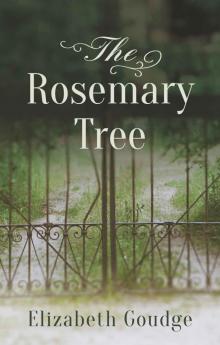 The Rosemary Tree
The Rosemary Tree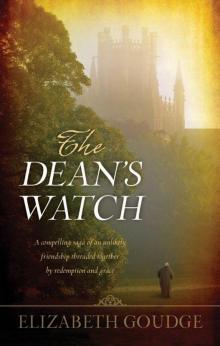 The Dean's Watch
The Dean's Watch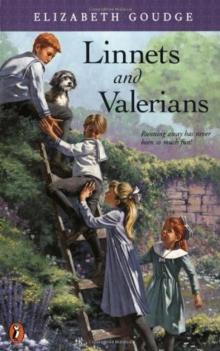 Linnets and Valerians
Linnets and Valerians Gentian Hill
Gentian Hill B00DRI1ZYC EBOK
B00DRI1ZYC EBOK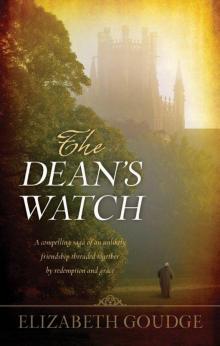 B008O6ZWTG EBOK
B008O6ZWTG EBOK The Scent of Water
The Scent of Water Pilgtim's Inn
Pilgtim's Inn Island Magic
Island Magic Pilgrim's Inn
Pilgrim's Inn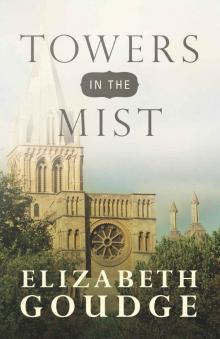 Towers in the Mist
Towers in the Mist Green Dolphin Street
Green Dolphin Street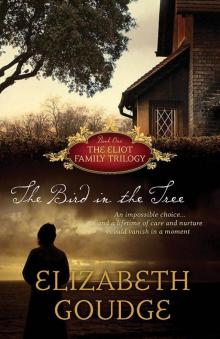 The Bird in the Tree
The Bird in the Tree The Child From the Sea
The Child From the Sea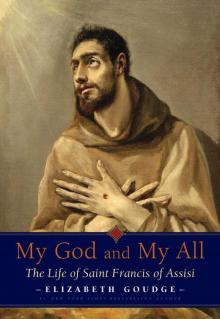 My God and My All: The Life of Saint Francis of Assisi
My God and My All: The Life of Saint Francis of Assisi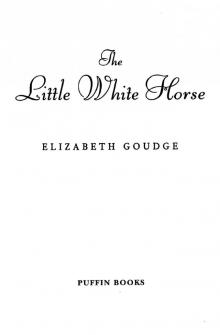 The Little White Horse
The Little White Horse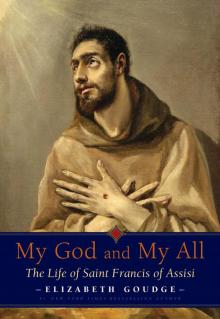 My God and My All
My God and My All B00CKXCNH8 EBOK
B00CKXCNH8 EBOK